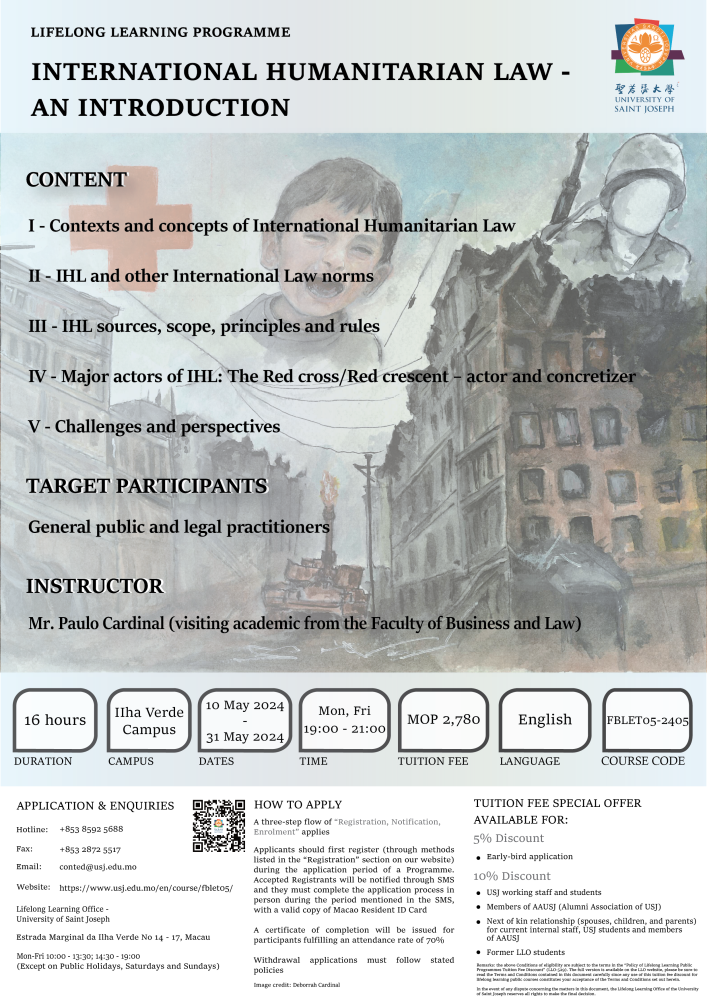International Humanitarian Law – An Introduction
國際人道法簡介
Lifelong Learning

International Humanitarian Law (IHL), otherwise known by its less palatable label as, for example, the law of war, has a co-natural relation to international (in)security since it regulates conducts in wars. Although relatively recent and anchored in the Solferino effect, history provides much earlier examples of humanitarian condiments in the jus in bello. IHL walks along with human dignity.
Some topics to be addressed: IHL history, concept, context, relationship with other international laws; IHL sources, scope, principles and rules, namely the Geneva conventions. The Red cross/Red crescent – actor and concretizer.
IHL challenges and perspectives – Technological advances, e.g. AI, evolution and sedimentation of the individual in international law, televised wars as catalyst of global awareness, a permanent member of the UNSC waging war with disregard of international law, including IHL, the human tragedies in Gaza and in Israel purporting utter disrespect for IHL: A «perfect storm» for security and international law issues.
Preliminary Course Content:
I – Contexts and concepts of International Humanitarian Law
- First approach and history in a nutshell – main epochs of IHL from Procopius to Solferino to Geneva(s) to Ukraine and Gaza
- Continuation: IHL is facing its Regina Viarum and so: Quo Vadis? From (Cicero) Silent enim lēgēs inter arma to Inter Arma Caritas, to what? Is there an Acquis Humanitaire?
- International Humanitarian Law: nature, a definition, philosophy, purposes and a context – it is public international law and it operates in times of war (but what wars?)
- Idem: International Humanitarian Law (IHL), Law of War (LoW) jus in bello, or the Law of Armed Conflict (LOAC): can all these today equally well be called IHL? A myth in words and labels?
II – IHL and other International Law norms
- Humanization of International Law – v.g., International Humanitarian Law, International Human Rights Law, International Criminal Law
- Idem: a comprehensive perspective of International Law and of the Individual in international law and in international community
- In particular: the relationships and borders between International Humanitarian Law and International Human Rights
III – IHL sources, scope, principles and rules
- Sources of IHL – v.g., Geneva Conventions, customary international law – and a description of the IHL legal system and cardinal solutions
- Scope and geography of IHL application – some issues and some challenges as to when IHL applies
- The humans entitled to protection – v.g., civilians, non-combatants, prisoners of war, wounded and sick soldiers, humanitarian workers
- The subjects bound by IHL – v.g., States, non-state armed groups, fighters (in general)
- Basic tenets of IHL and what is imposed by IHL – obligation of humane treatment, prohibition on adverse distinction, protection of persons in detention
- Basic principles governing the use of force in situations of armed conflict – The principle of distinction protecting civilians from attack, The prohibition on indiscriminate attacks, Proportionality, Precautions in attack, Precautions against the effects of attacks
- The legal rules of IHL regarding occupation
- The aftermath: How can states and individuals be held accountable for violations of IHL?
IV – Major actors of IHL: The Red cross/Red crescent – actor and concretizer
- The role and relevance of the IC Red Cross/Red Crescent: an introduction and some issues
- Continuation: The IC Red Cross/Red Crescent as a main actor and concretizer in IHL
V – Challenges and perspectives
- A brief on challenges and perspectives of IHL – Can it survive as Law proper?
- Tensions between Law and Security.
- (Some) Challenges: Emerging technologies and responsibilities under IHL, in particular the use of AI. Protection of animals in times of war. Protection of cultural sites in times of war. Environmental protection in times of war.
- A helping hand from International Human Rights Law and courts?
- International criminal law and international courts another helping hand?
Details:
| Instructor: | Mr. Paulo Cardinal |
| Duration: | 16 Hours (8 Sessions) |
| Date: | 13 May to 31 May 2024 |
| Time: | Mon, Fri 19:00 – 21:00 |
| Location: | University of Saint Joseph – IIha Verde Campus |
| Language: | English |
| Delivery of Mode: | Face-to-face Lecture |
| Tuition Fee: | MOP2,780 |
| Targeted Participants: | General public and legal practitioners |
| Online Registration Form: | Click here |

┃5% Discount (MOP 2,641)
- Early-bird application
** Applicants who submit a complete course enrollment on or before 22 April 2024 will enjoy the early-bird special offer in this course. Registrants will be notified of enrollment details via E-mail and SMS after we receive the registration. Don’t miss it!
┃10% Discount (MOP 2,502)
- USJ working staff and students
- Members of AAUSJ (Alumni Association of USJ)
- Next of kin relationship (spouses, children, and parents), for current internal staff, USJ students, and members of AAUSJ
- Former LLO students
Notes: the D.S.E.D.J. 2023-2026 Continuing Education Development Subsidy Scheme is NOT available for this course.
Remarks: the above Conditions of eligibility are subject to the terms in the “Policy of Lifelong Learning Public Programmes Tuition Fee Discount” (LLO-529). The full version is available on the LLO website (click here), please be sure to read the Terms and Conditions contained in this document carefully since any use of this tuition fee discount for lifelong learning public courses constitutes your acceptance of the Terms and Conditions set out herein. In the event of any dispute concerning the matters in this document, the Lifelong Learning Office of the University of Saint Joseph reserves all rights to make the final decision.
Main Bibliography in English
MARCO SASSÒLI, International Humanitarian Law, Edward Elgar, 2019
NILS MELZER, International Humanitarian Law – A Comprehensive Introduction, ICRC, 2019
MARCO SASSÒLI/ ANTOINE A. BOUVIER/ANNE QUINTIN, How Does Law Protect In War?, Vol. I, Outline of International Humanitarian Law, ICRC, 2011
BEN SAUL/DAPO AKANDE, (eds), The Oxford Guide to International Humanitarian Law, OUP, 2020
CORDULA DROEGE/EIRINI GIORGOU, How international humanitarian law develops, International Review of the Red Cross, 2022
Further Readings
ROBERT KOLB, Advanced Introduction to International Humanitarian Law, Elgar, 2014
PAOLA GAETA/MARCO SASSÒLI/ANDREW CLAPHAM, The 1949 Geneva Conventions: A Commentary, OUP, 2015
RENÉ PROVOST, International Human Rights and Humanitarian Law, CUP, 2002
ROBIN GEIß/NILS MELZER (eds), The Oxford Handbook of The International Law of Global Security, OUP, 2021
EVE MASSINGHAM/ANNABEL MCCONNACHIE, Ensuring Respect for International Humanitarian Law, Routledge, 2021
AMICHAI COHEN/DAVID ZLOTOGORSKI, Proportionality in International Humanitarian Law – Consequences, Precautions, and Procedures, OUP, 2021
EZEQUIEL HEFFES/MARCOS D. KOTLIK/MANUEL J. VENTURA, (Eds) International Humanitarian Law and Non-State Actors, Springer, 2020
HEIKE KRIEGER/JONAS PÜSCHMANN, Law-making and legitimacy in international humanitarian law, Elgar, 2021
JONATHAN CROWE/KYLIE WESTON-SCHEUBER, Principles of International Humanitarian Law, Elgar, 2013
AMANDA ALEXANDER, A Short History of International Humanitarian Law, European Journal of International Law, 2015
MICHAEL WOOD, The Evolution and Identification of the Customary International Law of Armed Conflict, Vanderbilt Law Review, 2018
ANDREW CLAPHAM/PAOLA GAETA, The Oxford Handbook of International Law in Armed Conflict, OUP, 2014
YORAM DINSTEIN/ARNE WILLY DAHL, Oslo Manual on Select Topics of the Law of Armed Conflict – Rules and Commentary, Springer, 2020
KATE PARLETT, The Individual in the International Legal System, CUP, 2011
ILIAS BANTEKAS/LUTZ OETTE, International Human Rights Law and Practice, CUP, 2020
Documentation and Cases
MARCO SASSÒLI/ ANTOINE A. BOUVIER/ANNE QUINTIN, How Does Law Protect In War?, Vol. II – Cases and Documents, ICRC, 2011
MARCO SASSÒLI/ ANTOINE A. BOUVIER/ANNE QUINTIN, How Does Law Protect In War?, Vol. III – Cases and Documents, ICRC, 2011
https://casebook.icrc.org/
HOW TO APPLY
A three-step flow of “Registration, Notification, Enrolment” applies.
Applicants should first register (through methods listed in the “Registration” section on our website) during the application period of a Programme. Accepted Registrants will be notified through SMS and they must complete the application process in person during the period mentioned in the SMS, with a valid copy of Macao Resident ID Card.
A certificate of completion will be issued for participants fulfilling an attendance rate of 70%.
Withdrawal applications must follow stated policies.
Remark: Programmes may be cancelled due to insufficient registration.










